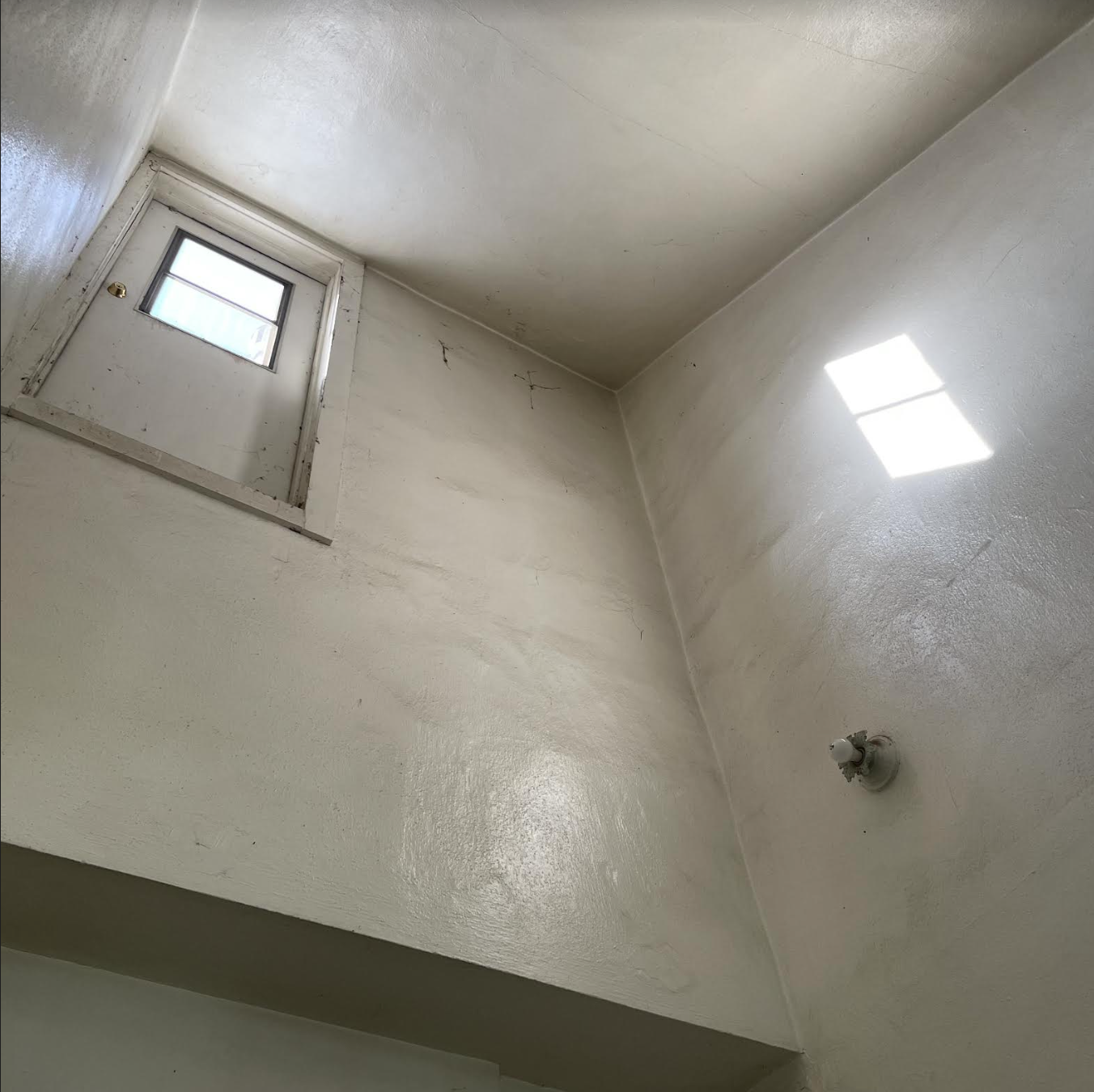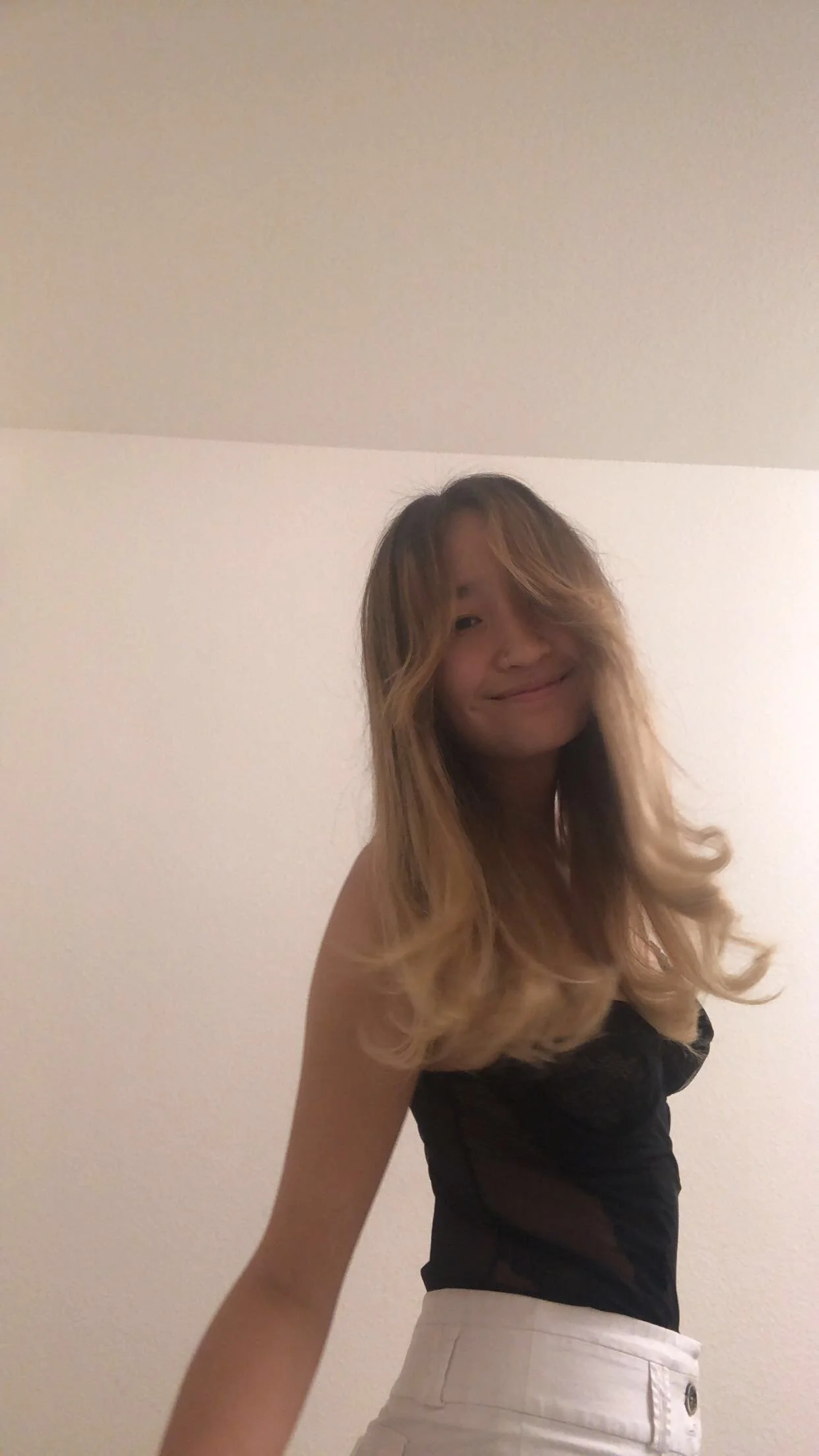short story | June 9, 2022
Through Cracks in
the Floorboards
by Lola Watts
Knowing that there was no way out, I replied, “I won’t. I won’t let you go.”
Your face softened, apparently relieved by my answer. I blushed, and thought about my grandmother. I imagined sitting with my grandchildren in a suffocating room as I talked about my coffee date with my dear departed. Though the thought sickened me, I looked up into your eyes, grabbing your gloved palm and placing it on my lower back. I never said anything more, but as I pulled your chin towards mine and we shared a frozen breath, a promise was cast that day. Sealed in time, you were linked to me, and I you.
That night, I stared fixedly at the ground; waiting for the memory of a rat to jump over my foot. I waited and waited, to see a hole it might have scurried into. It never appeared. I paced around my home, searching for a chip in the paint, or a fissured window pane–anything that could allow for travel from one place to another. My eyes grew red without sleep. Across cracks in floorboards and chipped paint, I knew there was something strangely intoxicating about this feeling, almost too powerful to place into words. I couldn’t place my finger on this presence, my mysterious ghost.
I thought of how much I wished you were there beside me, tucked beneath the sheets of my bed. I thought of your hand just barely grazing mine as I let my eyes sew themselves shut. I wanted to wake up and smell your green apple shampoo on the pillow beside me, even after you had left.
…
Memory, particularly the clarity of which, is a peculiar thing. They say we tend to remember things wrong, meaning that the time where you think you saw the supernatural entity in the subway station all those years ago was just the product of a child’s imagination running wild. The memory where a stranger tells you the secrets that line the inner folds of life’s robes is actually a monologue from the sitcom you watched earlier.
My great grandmother had Alzheimer’s before she died. I was sixteen then. When my family would visit her in the nursing home she would talk about seeing her late husband Dewey; they had tea earlier that day. He had been gone fifteen years, but she still met up with him for Earl Grey from time to time. Happily haunted, her clandestine meetings with him occurred until she died.
She left her hands open at her side as if an imaginary figure was intertwining its fingers with hers. Maybe there was someone, something there, embedded in a metaphysical world, in a place that bridges the gap between forgotten memories. This place lies in the cracks between the wooden floorboards in our homes, just out of the grasp of tangibility.
I thought about her gushing to us, spilling the secrets of her and Dewey’s conversations, as we sat on the washed out couches. She was like a little girl, I saw her blush. It seemed like a softness rimmed her eyes, her wrinkles would smooth out and her voice sounded adolescent. A nurse would walk in, her wrinkles refolded on her cheeks, and I would be snapped out of my trance.
Back then, I spent my days and nights reading. I never concerned myself with love. Sure, I had a few schoolgirl crushes, but when I saw the cold similarities in the boys around me, I turned elsewhere. My mother would always call me bitter, but I preferred to spend my time pondering life’s meanings. I was still in high school at the time, and without any prospect of a first love, I underwent a self induced hermitization instead. In my mind, I believed that I was living like an old academic, which in turn, became my path in determining the idiosyncrasies of life. My only taste of love came from hearing my grandmother’s recitals. After her funeral, I often found myself thinking about Dewey and her. A dull pain would wash over me. Unable to read, I would sit in bed, staring at my ceiling. I could barely move.
What a funny notion: kids hunched over their books in their childhood homes as they trace a sole idea, and just when they think that they have found it, it slips through the cracks in their fingers. I was far too young to understand the literature I read, too young to even understand I was too young.
…
Years later, I was in my mid-twenties, and I first met you. You told me you wanted to be a businessman. I asked you what that meant and you laughed and said, “Nothing, it means nothing.” You pushed your beautiful golden hair out from your eyes and looked at me as you held my wrist. Your scalp always smelled like green apple shampoo back then. I felt you breathe into my hair, the crispness of the autumn air.
I could see our breath in the strong wind. My toes were cold from the gaps in my shoes and the holes in my tights. I shifted my weight and heard the crack of a thousand tiny leaves’ spines beneath my feet. “Let’s go back, it’s too cold out here.”
You smiled, closed your eyes, and said, “I love you. You seem to understand everything. I start a thought and you know just what to say before I tumble into this abyss.” You swallowed. “Promise me that you’ll never let me go?”
The wind shifted into stillness. I smelled something familiar, outside of the autumnal leaves and the green apple scent on your scalp. The air began to feel groggy and humid. My tights became sticky against my legs. I felt my eyes close, dragged by a threaded needle that was sewing my eyelids down.
The leaves beneath me faded, dematerialized. I saw a rat dart over my shoes. The blur of a train entered my vision. Its wind felt moist, bringing with it the smell of too many humans crammed beneath the ground, waiting for the L Train. A man with dark hair stepped off of the train onto the platform beside me. With each step he took, I heard a crack above me.
I glanced upwards, and saw that the ceiling of the subway station was made of wooden floorboards. Magnified footsteps sounded down from above them, sending loud thuds throughout the station. I looked around, and saw that I was the only one staring upwards. The other people within the station all talked amongst one another, or remained gazing fixedly at the tracks. I heard a voice, and then another, seeping in from the world above the subway station.
“Dewey, I found the kettle. Come back, dear.”
“I’m here, I’m here.”
“Take my hand. Your palms are always too cold!”
“It was windy outside.”
“You’re safe now, feel how warm it is. Drink up. And you must hurry back when you go outside, my family is starting to think I’m suffering from psychosis! I tell them about you all the time. I wish they could see it, see you the way I do.”
The dark haired man on the platform next to me laughed. His eyes crinkled at the corners. I heard the sound of laughter above the floorboards seconds later.
Swarms of travelers moved about as a new train rolled in. The chattering bodies boarding and disembarking the train flitted amongst one another, finally drowning out the conversation above into a monotonous hum. I thought I saw one body pass through another, as they rushed to and from the train doors. One last waft of sticky air blew my hair back as the final train left the station. I saw the rat scurrying along the tracks now, and finally dart safely into a hole. I could smell my great grandmother’s chamomile tea amidst the heat.
As quickly and sporadically as they came, the noise and the voices all washed away at once, down the tracks and deep beneath the ground. The dark haired man had disappeared into the swarms of people around me. I stopped hearing the creaking floorboards above and began to smell dry leaves again.
I once again felt the chill of the wind shoving through my tights. I was back. I forced my eyes open, breaking the thread that had sewed them down. I saw you staring intently at me again. I squirmed beneath your gaze. Your golden hair shifted in each gust of wind. Knowing that there was no way out, I replied, “I won’t. I won’t let you go.”
Lola Watts is a student, writer, and lover of cats. She hopes to be a novelist and journalist, but until then can be found wandering the beaches of California.



